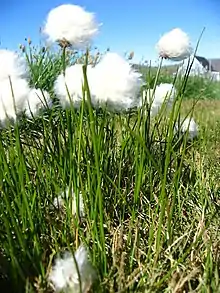Reconstruction:Proto-Slavic/bolto
Proto-Slavic

Etymology
Most likely substantivized[1] from Proto-Balto-Slavic *bálˀtas (“faint, white”). Cognate with Lithuanian báltas (“white”), balà (“swamp”), Latvian balts (“white”), and the second part of Old Prussian placename Namuyn-balt.
The semantic connection between "white" and "swamp, mud" is not obvious, but has been attested in many languages. Beside the mentioned Lithuanian, also in e.g., Old Polish biel (“mud, swamp”) (< *bělь, from *bělъ (“white”)). This is probably due to the widespread presence of the marsh grass called cottongrass (genus Eriophorum), whose the white fluffy seed heads are white, or the color of the dried clay taking light hue, depending on soil.
Though formally and semantically derivable from Proto-Indo-European *bʰelH- (“white”), with cognates such as Albanian baltë (“mud”), Romanian baltă (“mud, swamp”) and Greek βάλτος (váltos, “swamp”), it is often considered an Illyrian substratum word (or from another, unidentified substrate language; cf. Proto-Slavic *bala (“marsh”)) due to the fact that most of the cognates are restricted to the Balkan peninsula, or its surroundings. However, these can also be borrowings from early Slavic; indirect evidence shows that the Slavic liquid metathesis and pleophony happened well after the spread of Slavic to the Balkans and the word must have been pronounced as *balta or *bolto as recently as the late 8th century.
Declension
| Singular | Dual | Plural | |
|---|---|---|---|
| Nominative | *bòlto | *bòltě | *bòlta |
| Accusative | *bòlto | *bòltě | *bòlta |
| Genitive | *bòlta | *bòltu | *bòltъ |
| Locative | *bòltě | *bòltu | *bòltě̄xъ |
| Dative | *bòltu | *bòltoma | *bòltomъ |
| Instrumental | *bòltъmь, *bòltomь* | *bòltoma | *bòltȳ |
| Vocative | *bòlto | *bòltě | *bòlta |
Derived terms
- *boltěnъ
- *boltina (“marshland”)
- *bolišče (“swampy place”)
- *boltuxъ
- *boltъ (“swampy”)
- *boltьnъ (“swampy; muddy”)
- *boltьno
- *boltьnica
Related terms
- *bolna (“faintness; clump of mud”)
Descendants
- East Slavic:
- South Slavic:
- West Slavic:
Further reading
- Vasmer, Max (1964–1973), “болото”, in Этимологический словарь русского языка [Etymological Dictionary of the Russian Language] (in Russian), transl. and suppl. by Oleg Trubachyov, Moscow: Progress
- Chernykh, P. Ja. (1993), “болото”, in Историко-этимологический словарь русского языка [Historical-Etymological Dictionary of the Russian Language] (in Russian), volume 1 (а – пантомима), 3rd edition, Moscow: Russian Lang., →ISBN, page 101
- Sławski, Franciszek, editor (1974), “*bolto”, in Słownik prasłowiański [Proto-Slavic Dictionary] (in Polish), volume 1 (a – bьzděti), Wrocław: National Ossoliński Institute, page 311
- Trubachyov, Oleg, editor (1975), “*bolto”, in Этимологический словарь славянских языков [Etymological Dictionary of Slavic Languages] (in Russian), issue 2 (*bez – *bratrъ), Moscow: Nauka, page 179
- Georgiev V. I., editor (1971), “блато”, in Български етимологичен речник [Bulgarian Etymological Dictionary] (in Bulgarian), volume 1, Sofia: Bulgarian Academy of Sciences, page 54
- “baltas”, in Lietuvių kalbos etimologinio žodyno duomenų bazė [Lithuanian etymological dictionary database], 2007–2012
References
- Matasović, Ranko (2013), “Substratum words in Balto-Slavic”, in Filologija, volume 60, Zagreb, published 2014, page 76 of 75–102
- Derksen, Rick (2008), “*bòlto”, in Etymological Dictionary of the Slavic Inherited Lexicon (Leiden Indo-European Etymological Dictionary Series; 4), Leiden, Boston: Brill, →ISBN, page 53: “n. o (a) ‘swamp’”
- Olander, Thomas (2001), “bolto”, in Common Slavic accentological word list, Copenhagen: Editiones Olander: “a (SA 151; PR 132)”
- Kapović, Mate (2007), “The Development of Proto-Slavic Quantity”, in Wiener Slavistisches Jahrbuch, University of Vienna, page 5: “*bőlto”
- Snoj, Marko (2016), “blato”, in Slovenski etimološki slovar3 (in Slovene), https://fran.si: “Pslovan. *bőlto”